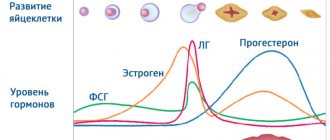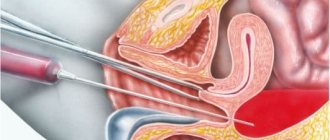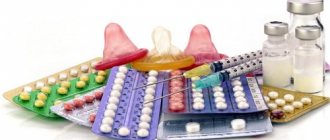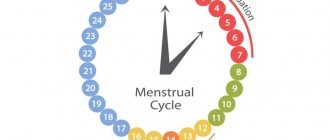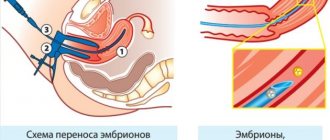How is follicle puncture performed during IVF?
After inducing the ovulatory process as part of an IVF cycle, the next step is to obtain follicles. This manipulation is performed through the vagina with a special needle under local or general anesthesia (determined by the anesthesiologist). Negative pressure is created in the needle, which promotes the aspiration of biomaterial containing female reproductive cells.
After the puncture is performed or from the next day after it, the woman is prescribed hormonal drugs to maintain the luteal phase. Hormone therapy is mandatory, because In IVF cycles, corpus luteum deficiency is predicted due to luteinizing hormone deficiency.
What is this procedure
First of all, it should be noted that ovarian puncture is a medical procedure performed either in preparation for IVF or as a treatment for cystic formation. In addition, it is carried out directly through the vagina using ultrasound for control. It is often performed under general anesthesia and extremely rarely under local anesthesia. This is because the procedure can be painful and unpleasant. The duration of such manipulations rarely exceeds a quarter of an hour.
Before IVF, such a procedure is prescribed only if there are clear indications for this, for example, when one of the spouses has infertility. Before its implementation, the patient must strictly adhere to the recommendations given by the doctor to maintain her body, as well as prepare it for the onset of pregnancy.
But puncture of an ovarian cyst is a very simple operation. During its implementation, the contents from the abnormal formation are promptly removed through a puncture, after which no traces of manipulation remain. However, such treatment is prescribed only when the pathology is at the initial stage of development.
That is why it is important to identify it at an early stage. The postoperative rehabilitation period is only one day
Consequences of follicle puncture during IVF
Even at the stage of preparation for puncture, women are given hormone therapy, which stimulates the development and growth of several follicles at the same time. This leads to a significant increase in the size of the ovaries. Therefore, even on the eve of egg retrieval, the patient may already feel slight discomfort.
After the intervention, pain may appear as the vaginal wall is injured and the arteries and veins in the ovaries are damaged. As a result, some women experience severe abdominal pain during follicular puncture, while others experience only minor pain. The intensity of the sensation depends on the individual threshold of pain sensitivity and the number of eggs obtained.
Indications and contraindications for the procedure
The main indication for puncture is the treatment of infertility using in vitro fertilization. The manipulation is performed at the second stage of the protocol. Statistics show that about 15% of couples suffer from infertility and need in vitro fertilization. Regardless of whether we are talking about male or female factor, ovarian puncture and egg retrieval are always carried out.
Another indication for puncture is ovarian tumors. Not all cysts undergo this procedure.
In case of malignant neoplasm, priority remains with surgical intervention (laparoscopy or laparotomy). It is advisable to perform a puncture when there is doubt about the origin of the cyst. It may be functional (not requiring treatment) or non-functional (requiring hormonal correction or surgical treatment). The study sets the vector for further medical action.
Purulent formations and abscesses on the gonads are a reason for puncture if there is a risk of their rupture. Laparoscopy is being considered as an alternative treatment method, but the final decision is made only taking into account the individual characteristics of the patient.
Why does my stomach hurt after a puncture?
So, painful sensations in the lower abdomen after puncture collection of follicles are due to three main reasons. Firstly, this is a direct injury to the upper third of the vaginal wall. For the same reason, slight bleeding from the genital tract may appear, which goes away on its own after 1-2 days.
Secondly, pain is associated with an initial increase in pressure inside the ovary due to ovulation induction carried out the day before. The more follicles have matured and the larger their diameter, the stronger the discomfort.
Thirdly, damage to ovarian tissue by a puncture needle inevitably leads to vascular injury. Blood flows out, further increasing the volume of the ovary. The capsule is stretched, which irritates the nerve endings located in it. Pain sensations of varying intensity appear.
Thus, mild pain after puncture retrieval of eggs is normal.
What is ovarian puncture
Ovarian puncture is a medical procedure that involves taking the contents of the reproductive gland for further use.
The procedure is performed exclusively within the walls of a hospital. The patient first undergoes a series of preparatory procedures, and the doctor chooses the method of pain relief. The puncture is a mandatory condition of the IVF protocol. After receiving the material, fertilization is carried out in vitro. The final stage of in vitro fertilization is the transfer of embryos into the uterus. The puncture also involves the treatment of tumors of the gonads. Using a well-known procedure, the contents of the cyst are collected for subsequent study. The histology performed gives a clear picture of the tumor process.
The procedure is a minimally invasive procedure. It is known that the smaller the area of tissue damage, the faster the recovery and the lower the risk of complications. Based on this, we can call ovarian puncture a safe procedure. However, we should not forget that it is still a surgical intervention and also requires the use of anesthesia.
Today, ovarian puncture is recognized as a safe and accessible medical procedure. All women, without exception, who want to undergo IVF with their own eggs are subjected to it.
What to do if you have abdominal pain after a puncture
Considering the fact that abdominal pain after follicular puncture is a normal condition, you can do nothing. The pain goes away on its own within a few hours or a few days (the duration is determined by the individual characteristics of the body).
Women with a low pain threshold may need to take pain medications. Which remedy will alleviate the condition should be discussed in advance with the gynecologist who is performing the procedure. Painkillers are not always acceptable.
Dangerous symptoms
Every woman on the protocol dreams of success, but not everything is always smooth sailing. You need to learn to listen to the body, and it will definitely give clues.
Bloating and pain. If your stomach is bloated, this is a manifestation of a mild form of ovarian hyperstimulation, a completely adequate condition for such a situation. All you need to do is drink fluid (up to 4 liters per day). But when everything inside hurts and your stomach is very distended, this is a danger signal. It is strictly forbidden to take medications on your own; you must consult your doctor.
Temperature. As for the temperature after the puncture, a slight rise of 1-1.5 degrees is not a problem, because during surgery, this happens. But, if the temperature is above 38 degrees, hospitalization and diagnosis of the causes of hyperthermia are needed.
Allocations are also considered acceptable. During the manipulation of oocyte retrieval, the vessels in the vagina are injured, so the ovaries hurt and discharge is visible. We are talking about a smear interspersed with pink or pale brown blood. If there is heavy red blood discharge, urgent hospitalization is required.
If on the third day after the operation the pain does not decrease, it is better to go to see a doctor, because the consequences are not pleasant.
It is strictly forbidden to take painkillers without the doctor’s knowledge after follicle puncture.
The following is not typical for the postoperative condition:
- temperature rise above 38;
- very severe pain in the abdominal area;
- loss of consciousness;
- distension in the lower abdomen;
- diarrhea.
It is necessary to carefully monitor the condition after manipulation with egg retrieval. The slightest deviations from the standards will cause the fertilization protocol to be interrupted.
Can there be negative consequences of follicular puncture?
Follicle puncture is performed under ultrasound guidance. Therefore, complications are rare. However, sometimes this can happen.
- Formation of a hematoma in the ovary or intra-abdominal bleeding. Such consequences may be due to the individual characteristics of the course of blood vessels, as well as their significant size.
- Attachment of infection. This complication can occur in women with weak immune systems. To minimize risks, the procedure is performed when the vagina is in normal biocenosis (first or second degree of smear purity).
What you should pay special attention to
Sometimes, during an IVF cycle, ovarian hyperstimulation syndrome may occur, which adversely affects the general condition of the woman. It, like follicle puncture, is also characterized by the presence of pain, and its appearance may coincide in time with the egg retrieval procedure. However, this syndrome also has distinctive features. So, the accompanying symptoms are:
- increased body temperature above 38°C;
- intense abdominal pain, which only slightly subsides after taking painkillers;
- nausea and vomiting;
- difficulty urinating;
- the appearance of repeated loose stools;
- bloating;
- increase in abdominal circumference.
In severe cases, overstimulated ovaries lead to ascites. This is an accumulation of fluid filtered from plasma in the abdominal cavity. As a result, the volume of circulating blood decreases, therefore blood pressure drops and overall well-being suffers greatly.
When to see a doctor
The follicle puncture procedure is rarely accompanied by complications. Therefore, mild pain in the lower abdomen is not regarded as a dangerous condition. However, there are a number of symptoms that should alert you. These include:
- Profuse bleeding from the genital tract, which may indicate serious vascular injury.
- Discharge from the genital tract with an unpleasant odor. This symptom may indicate an infection.
- Increasing abdominal pain that progresses over several hours. May be a sign of intra-abdominal bleeding. The likelihood of this complication is especially high if the pain is combined with dizziness, low blood pressure, pale skin and/or loss of consciousness.
- Pain in the lower abdomen, nausea and vomiting, flatulence, decreased blood pressure. Such signs may indicate the development of ovarian hyperstimulation syndrome (several follicles simultaneously mature in the gonads, reaching large sizes).
In all these cases, you should immediately contact the clinic where the IVF protocol is performed. The woman needs dynamic monitoring and medical care. In most cases, conservative treatment is sufficient.
Advantages of treatment at the SM-Clinic reproductive health center
Reproductive Health Center "SM-Clinic" uses assisted reproduction methods in accordance with international protocols based on evidence-based medicine. Our specialists regularly improve their professionalism at the best clinics in the field of human reproduction. We have installed modern equipment that allows us to monitor folliculogenesis and changes in the endometrium down to the smallest detail. All these circumstances are the key to the safety and high effectiveness of the treatment methods used.
Doctors at the SM-Clinic reproductive health center will help you become parents without risk to your health. We provide assistance at all stages of infertility treatment.
Preparatory activities before the procedure
Ovarian puncture is a manipulation that requires mandatory preliminary examination and careful preparation. Mandatory preoperative items are modified in accordance with the indications for the procedure. Each patient undergoes the following examinations:
- blood test (general and biochemical);
- Analysis of urine;
- cardiogram;
- fluorography;
- test to determine blood clotting;
- Ultrasound of the pelvic organs;
- examination by a gynecologist;
- flora smear;
- cytology.
If the puncture is carried out in the IVF protocol,
then before the eggs leave the place of their formation, an hCG injection is given. The injection helps the oocytes mature to the desired state. The procedure for collecting material is prescribed 35 hours after the administration of the hormonal drug. It is important not to miss this time period, since it will no longer be possible to extract ovulated gametes. In addition to the generally established preparation rules, the patient in the IVF protocol must follow the following rules:
- exclude sexual intercourse several days before the procedure;
- eat protein foods, exclude gas-forming and salty foods;
- minimize fluid intake;
- on the eve of the operation, have a light dinner, and on the day of the procedure, refuse any food;
- stop all medications except those prescribed by a doctor;
- exclude physical activity;
- a few hours before surgery, cleanse the intestines naturally or with laxatives (enemas, suppositories).

